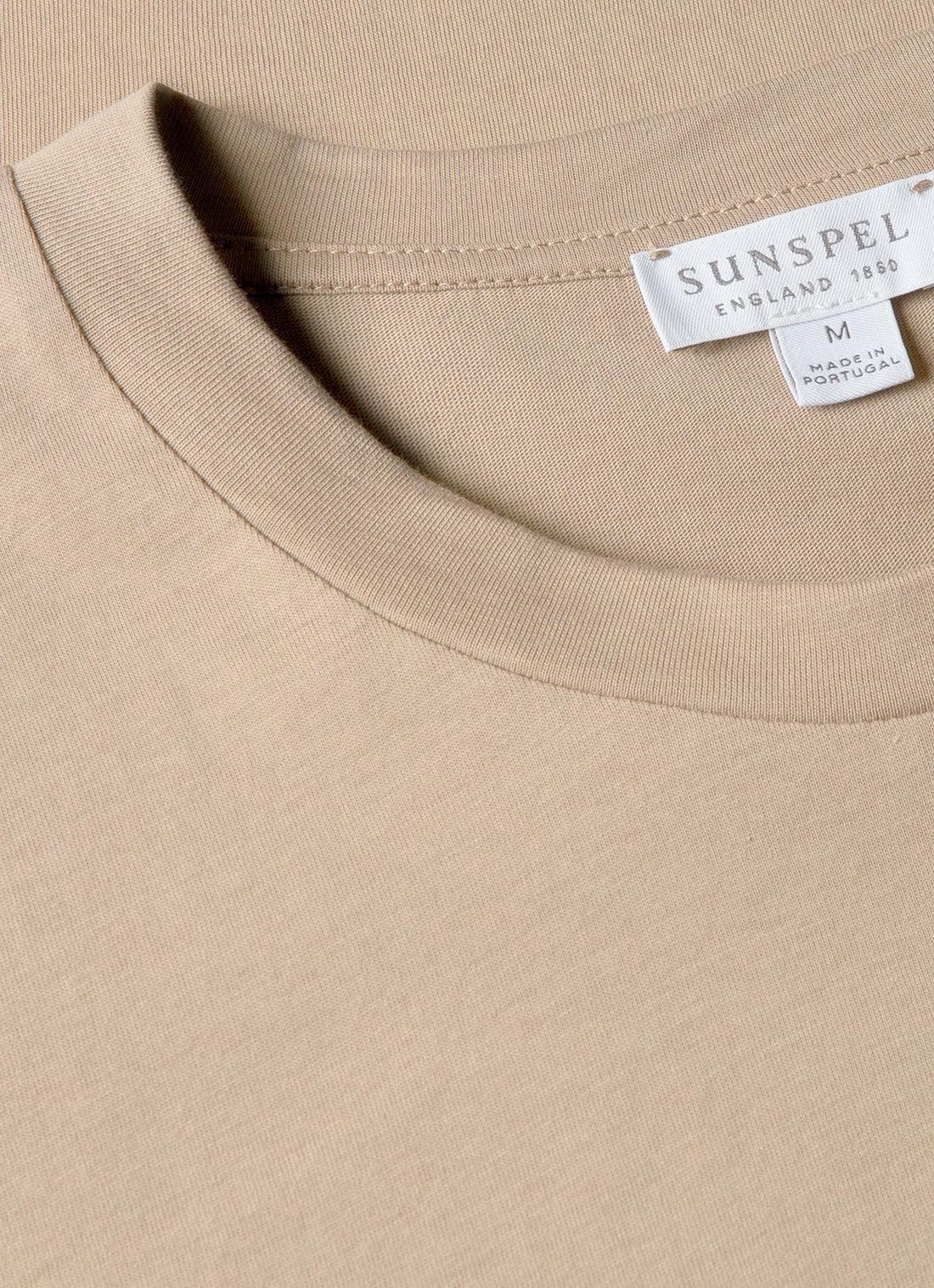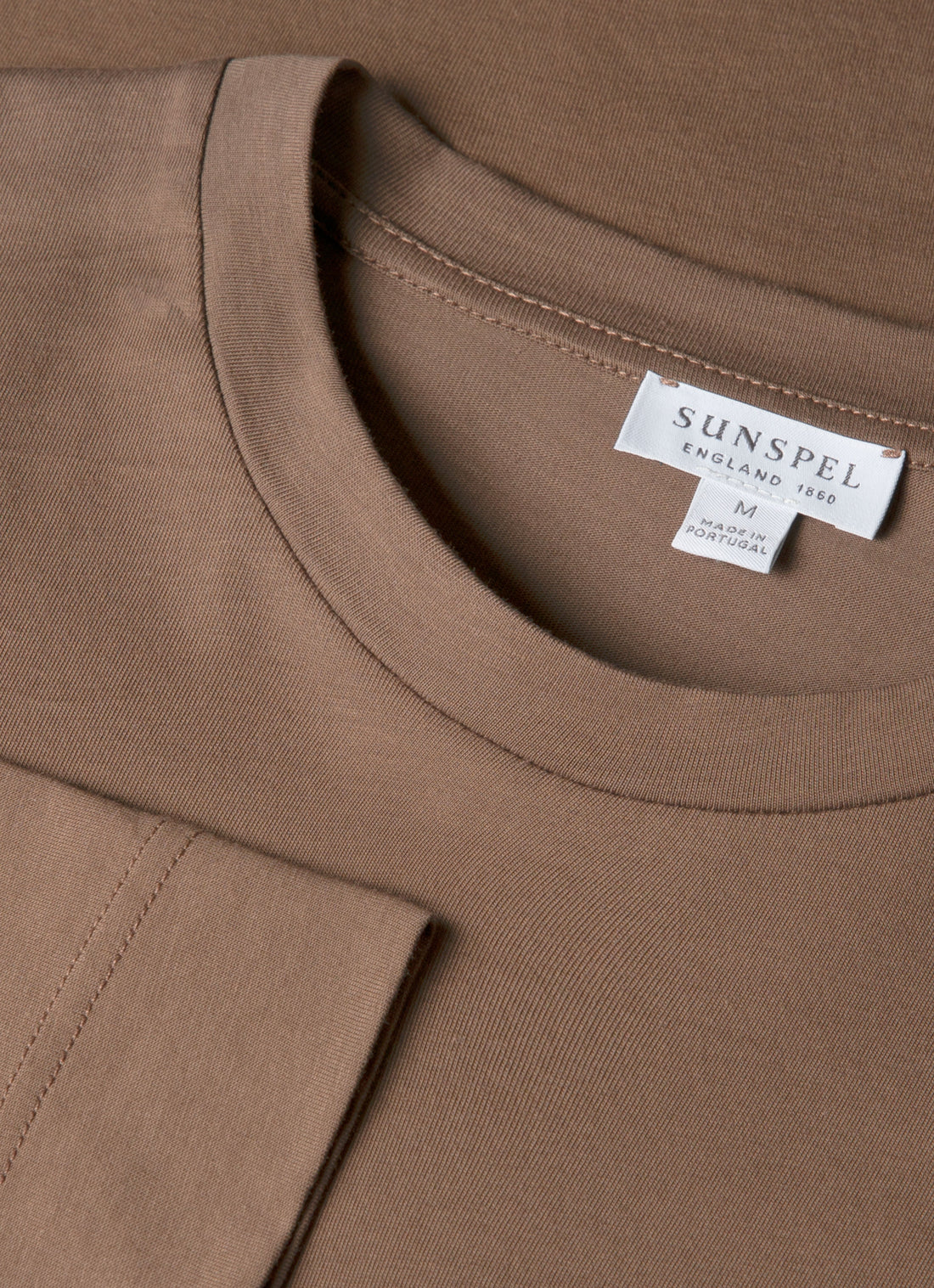How to Care for Your T-shirt
 |
How to care for your T-shirt
Sunspel made some of the world’s earliest T-shirts in the early 1900s and we've been perfecting them ever since in our factory in Long Eaton, England. Ensuring our T-shirts last is very important. Our fabrics are knitted to be as durable as possible from the finest extra-long staple cottons. It's also important to look after your T-shirt to make sure it lasts as long as possible. Follow our guide to make sure yours remain wardrobe staples for years to come.
Other useful tips:
How often should you wash your T-shirt?
Only wash your T-shirts when necessary. Using your washing machine less is a good way to reduce your carbon footprint and will also improve the longevity of your garments. It’s a good idea to wash your clothes when you have enough to fill the machine and often simply hanging your T-shirt to air will reduce odours and allow another use.
(It’s also important not to overfill the machine as it prevents proper circulation and the friction will damage the clothes. However, make sure you have enough to make a wash worthwhile.)
How to machine wash your T-shirt
- Wash like with like – Always wash like with like to prevent colour leaching. Don’t mix your white T-shirts with other colours or they will become dull.
- Consider the different fabrics you’re washing together. Don’t wash delicate cotton T-shirts with harsher items like denim or clothing with loose metal zips and studs as this might damage the cotton.
- Turn your coloured T-shirts inside out - this helps preserve the shade.
- Wash cool and read the label – Generally, wash your T-shirts at 30-40°C as this will prevent shrinking and uses less energy. Always be sure to check the label. Sunspel 100% white cotton T-shirts should be washed on a gentle cycle at 30°C, for example.
- Use the correct amount of detergent – Using too little will not give a proper clean, while too much can trap dirt and odours into the fabric leaving white T-shirts grey or yellowed. Be sure to follow the instructions on the detergent.
- Reshape immediately – Once washed, remove your T-shirt from the machine as soon as possible and reshape it whilst damp. Shake it out from the hem, then gently stretch the T-shirt in the length first, followed by the width and sleeves, to restore its original shape.
How to dry your T-shirt
Avoid using a tumble dryer which can degrade the fabric and cause shrinkage, yellowing and bobbling. It is also very energy intensive. Instead, hang it on a washing line to air dry.
How to remove stains from a white T-shirt
Spot cleaning your T-shirt will allow you to wash it less. The first rule is to act immediately. Blot the stain with a clean cloth or paper towel to remove excess liquid. Then add some mild soap or detergent to the stain, and gently work in to remove as much as possible.
As an alternative, mix some baking soda into a paste with some water and apply to the areas in question. Allow it to dry, then simply brush off the baking soda. More stubborn stains may require a commercial stain remover, but you should avoid using chlorine bleach-based products.
If your T-shirt is heavily soiled, you may need to pre-soak it before putting it in the washing machine; always check the care instructions first.
Ironing, folding and storing your T-shirt
Check the iron settings on the T-shirt label. Using too high a heat can damage the fabric and leave marks so use a lower temperature. Add some steam or water before ironing, to help smooth and flatten the fibres.
For storing, it’s best to fold or roll them and put them on a shelf or in a drawer, out of direct sunlight. Hanging can cause the fabric to stretch or become misshapen around the neck and shoulders. If you must hang your T-shirts, use wide hangers and insert from the bottom up.
How to hand wash your T-shirt
Treat your T-shirt gently when hand washing. First, mix some detergent in a sink or bowl of warm water. Gently massage the T-shirt in the water, and then rinse it thoroughly using clean, cold water.
It is possible to wash your T-shirt in cold water and this will reduce the risk of shrinkage, damage and wrinkling that comes with higher temperature washes. Some stains are also less likely to bleed and set. However, most detergents work best at warmer (not hot) temperatures, ensuring that oils or perspiration are removed and reducing the risk of discolouration.
What does dry cleaning do to your T-shirt?
Dry cleaning involves the use of chemical solvents to remove dirt from your clothes, with little or no use of water. Before the process begins, the garment is inspected and pre-treated for any stains and is then loaded into a machine where it is agitated with the solvent solution.
Dry cleaning can help to remove certain stains and can also help prevent shrinking or stretching. However, it’s worth noting that it is not always that effective at removing some stains from cotton, such as sweat and body oils. Unless your T-shirt is heavily soiled, a gentle wash at 30°C will usually suffice.
Avoiding shrinkage of your T-shirt
Cotton has natural shrinkage, which often occurs during the first few washes. You can help to avoid shrinkage of your T-shirt by washing at 30°C. Tumble drying is another major cause of shrinkage and damage, particularly when it comes to finer cottons, so avoid tumble-drying your T-shirts and instead allow them to air dry.
What is the best way to clean your T-shirt without washing it?
To freshen your T-shirt without giving it a full wash, hang it outside to air as this helps get rid of odours. To spot clean and remove specific odours, mix some baking soda into a paste with some water and apply to the areas in question. Allow it to dry, then simply brush off the baking soda.































































